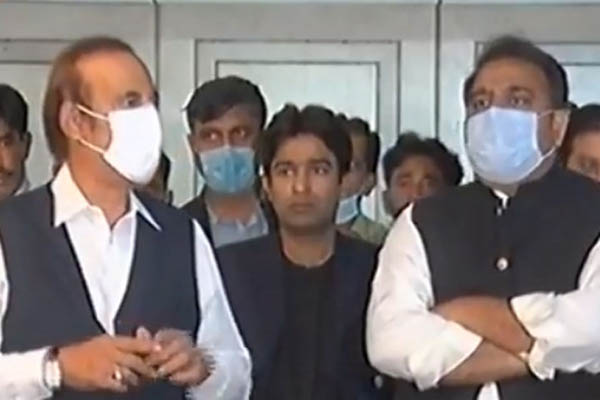
Courtesy Radio Pakistan
Ministers claim device fulfills requirements of Election Commission of Pakistan and will end allegations of rigging in future polls
The Pakistan Tehreek-e-Insaf-led government on Wednesday unveiled at Parliament House in Islamabad a prototype of an electronic voting machine it wants to utilize in the next general elections, with lawmakers claiming it will produce quick, verifiable results.
Displayed by Information Minister Fawad Chaudhry, Adviser to the P.M. on Parliamentary Affairs Babar Awan and Senate Standing Committee on Information Chairman Faisal Javed Khan, the EVM is one of five proposed models. According to Awan, three have been imported, while two are being manufactured in Pakistan. He said the Election Commission of Pakistan would have the authority to decide which of the proposed machines would be utilized in the general elections.
According to Radio Pakistan, Fawad claimed the prototype on display fulfilled 36 conditions mandated by the ECP for an effective electronic voting machine (EVM). He claimed the use of EVMs would expedite the issuance of election results, and would end the practice of losing candidates alleging rigging.
The information minister reiterated an invitation to all opposition parties, including the Pakistan Peoples Party and the Pakistan Muslim League (Nawaz), to visit Parliament House and test the EVM prototype themselves. “If they have any suggestions or concerns, they should share them with us,” he said, adding that EVMs were already being utilized in 20 countries and had helped to reduce allegations of rigging in neighboring India.
Fawad said the EVM prototype would also be made available to members of bar associations and their input would be sought before finalizing their use. He reiterated that the machines would create two records: paper and electronic. “The result cannot be manipulated, as a paper verification would be printed in addition to the vote being tallied electronically,” he stressed.
The information minister—who had spearheaded the indigenous development of EVMs as the Science and Technology Minister—said the system was also not linked to the internet to prevent claims of hacking. “They are standalone machines. They aren’t even connected to each other to reduce the chances of rigging even further,” he added.
Ending rigging allegations
Awan emphasized that EVMs were the best means to end the practice of rival candidates accusing each other of rigging after every elections. “Pakistan’s electoral system has been continuously plagued by a cancer of rigging allegations,” he said, adding that the ECP had been empowered to use EVMs in elections and give right of vote to the overseas Pakistanis through a presidential ordinance.
The adviser said voters would be identified through their national ID card, with the data being verified through National Database and Registration Authority (NADRA) records.
An official who helped develop the EVM prototype on display explained that the voting would be tallied through two modes: once a vote had been cast, it would be saved by the machine, while a ballot paper would be printed with the same. “No paper will go in to the hand of the voter,” he said, adding that the whole process could be completed within 30 seconds.
